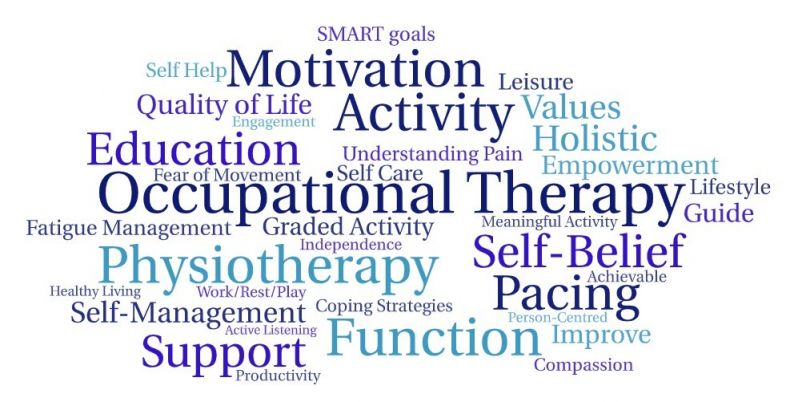PPSS: Allied Health Professionals (AHP)
Referral Criteria
You need to:
- Live in North Cumbria
- Have physical symptoms that are stopping you from living a happy, healthy life and that have lasted for at least 6 months
GPs, medics or physiotherapists can refer people into this service. If you are a health professional and unsure and would like to discuss a case with one of our team, click here for our duty consultation contact number. You can book an appointment to speak to us for further advice (this is not for patients - potential patients should speak to their GP/health team).
Who are we and what do we do?
We are a team of highly specialist physiotherapists and occupational therapists who work as part of the Persistent Physical Symptoms Service.
Living with persistent physical symptoms (previously known as chronic) can impact us in many different ways and understanding what is happening inside our bodies and brain can help us gain control and reduce their impact on our lives.
When pain and other symptoms continue, this can change our behaviour and activity levels which causes other problems such as reduced fitness, flexibility and strength. This is known as deconditioning and can make it hard, and sometimes frightening, to start moving again.
We work closely with psychological partners in order to provide holistic, person-centered care based upon Acceptance and Commitment Therapy. This is an approach that can help those with pain and other persistent symptoms. We follow the most up to date evidence for what is proved to be beneficial in order to help you understand your symptoms and provide strategies and advice on how to reduce their impact and bring quality back into your life
- We do this by providing education on how pain becomes persistent (chronic) and how this relates to our thoughts, emotions and behaviour. We provide strategies to self-manage over-sensitised nervous systems and support you in pacing activities in order to address the secondary changes that can occur as a result of reduced mobility due to pain and/or fatigue.
- Our physiotherapists may support you in developing a plan to gradually build up your exercise tolerance without aggravating your symptoms. We may suggest exercises and guide you through graded activity to address the secondary changes of weakness, soft tissue shortening and stiffness that often accompany persistent symptoms. Our occupational therapists will help you to apply the theory behind movement and activity to every day life and will provide advice on activities of daily living.
What to expect if you contact our service or come to see us?
After your initial assessment appointment with PPSS, you may be advised that a 1:1 appointment with a physio or OT is the best way to help you move forwards. If this is the case, you will be invited to opt in to an appointment slot when one becomes available. The physio or OT will discuss your needs with you and will work with you to develop a plan for helping you to self-manage your physical symptoms. It is important that you follow the advice of the physio/OT for you to progress and make changes to your quality of life. Changes will happen very gradually and remember that if we start to move again after a long period of inactivity, you may experience a temporary aggravation of symptoms, initially. This should be short-lived and with gradual steps you should soon be able to pace up your activity levels which has physical, psychological and social benefits.
Confidentiality
Details of your sessions are put on your medical record, but you can tell us if you do not feel ok with anything being shared with your GP or other members of your care team.
We will only talk about you outside the team when you give permission, or if we think you are at risk of harm and we need to protect you or others.
We will keep your GP and/ or consultant up to date by sending letters about your appointments so they know how you are and what you are currently working on – you will also get a copy of these letters
Why this approach?
We understand that your persistent symptoms have entered uninvited into your life and that this can be hard to understand and accept. However, evidence has shown that in some cases, a medical explanation and/or solution cannot always be found where pain and fatigue continue.
In the absence of the “quick fix” that we would prefer, a different approach is required and we call this the biopsychosocial model. This model recognises the many different aspects of your life that affect your symptoms; the biological, psychological and social elements. Although this approach takes time and commitment to following the strategies and advice, evidence has shown that this is the most effective way of managing persistent symptoms.
What do our patients say?
“Just wanted to convey my heartfelt thanks… today I showered and washed my hair and was able to reach and apply pressure when shampooing; something I have not been able to do for a couple of years.”
“I am using the Tai Chi videos regularly to replace swimming and it’s helping”
“I was a bit cynical when I first came but this has really helped”
“It really helps to know that I won’t damage myself by moving”
Click here to see resources from our Physiotherapists and Occupational Therapists (AHP's) in our PPSS service to help you to understand your persistent symptoms and provide strategies and advice on how to reduce their impact and bring quality back into your life.

